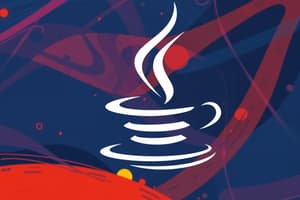Podcast
Questions and Answers
What is an object in programming?
What is an object in programming?
- A software blueprint
- A programming language
- A method in a class
- Every program that involves something being created or manipulated (correct)
What is a class?
What is a class?
A software blueprint for implementing objects of a given type.
What are public methods?
What are public methods?
Methods accessible to all client programs.
What does encapsulation mean?
What does encapsulation mean?
What is information hiding?
What is information hiding?
What are private methods and variables?
What are private methods and variables?
What is a static variable?
What is a static variable?
What does a driver class contain?
What does a driver class contain?
What is the purpose of an access specifier?
What is the purpose of an access specifier?
What is a return type?
What is a return type?
What do constructors do?
What do constructors do?
What is a default constructor?
What is a default constructor?
What are object variables?
What are object variables?
What are accessors?
What are accessors?
What are mutators?
What are mutators?
What are instance methods?
What are instance methods?
What are static methods?
What are static methods?
What are overloaded methods?
What are overloaded methods?
What does the signature of a method consist of?
What does the signature of a method consist of?
What is scope in programming?
What is scope in programming?
What is a block of code?
What is a block of code?
What is a local variable?
What is a local variable?
What does 'this' refer to in programming?
What does 'this' refer to in programming?
What is aliasing?
What is aliasing?
What are null references?
What are null references?
What are formal parameters?
What are formal parameters?
Study Notes
Object-Oriented Programming Concepts
- Object: Fundamental unit in programming that represents something being created or manipulated.
- Classes: Blueprints for creating objects of a specific type, defining their properties and behaviors.
Method Types and Access
- Public Methods: Accessible from any client program, allowing interaction with the object's functions.
- Private Methods and Variables: Restricted access, only callable within the defining class to maintain encapsulation.
- Static Variable (Class Variable): Shared across all instances of a class, maintaining a single value for the entire class.
Encapsulation & Information Hiding
- Encapsulation: Combines data and methods within a single structure, promoting modularity.
- Information Hiding: Limits access to certain data, enhancing security and reducing complexity.
Constructors
- Constructors: Specialized methods used to create and initialize a new object of a class.
- Default Constructor: Constructor without parameters that assigns default values to an object's attributes.
Method Characteristics
- Return Type: Specifies the type of data returned by a method; 'void' indicates no return value.
- Access Specifier: Determines the visibility of methods (e.g., public, private).
- Signature of a Method: Unique identification based on the method name and the types of its parameters.
Variable Scope
- Local Variable: Declared within methods or blocks; only accessible within that context.
- Scope: Defines the visibility range of variables and methods within the code.
Method Functionality
- Instance Methods: Work on specific instances of a class, allowing for object-specific behaviors.
- Static Methods: Operate on a class level, affecting all instances rather than individual objects.
- Overloaded Methods: Multiple methods share the same name but differ in their parameter types, enhancing flexibility.
Accessing and Modifying Objects
- Accessors: Methods that retrieve information from an object without changing its state.
- Mutators: Methods that modify an object's state, typically affecting one or more instance variables.
Memory Management
- Block: Code segment enclosed in braces {}; local variables' memory is released when the block is exited.
- Null Reference (Null Pointer): Indicates that an object has not been initialized, leading to potential errors if accessed.
- Aliasing: Occurs when multiple references point to the same object, which can create unexpected issues.
Additional Concepts
- Driver Class: Contains the main method where program execution begins.
- Object Variables: Variables that hold references to objects; they point to memory locations rather than storing objects directly.
- Formal Parameters: Variable placeholders in method definitions, representing the arguments passed during method calls.
Studying That Suits You
Use AI to generate personalized quizzes and flashcards to suit your learning preferences.
Description
Test your knowledge of essential vocabulary related to Java classes and objects with these flashcards. Each term is defined clearly, helping you understand core concepts like encapsulation and public methods. Perfect for Java learners looking to strengthen their programming terminology.



